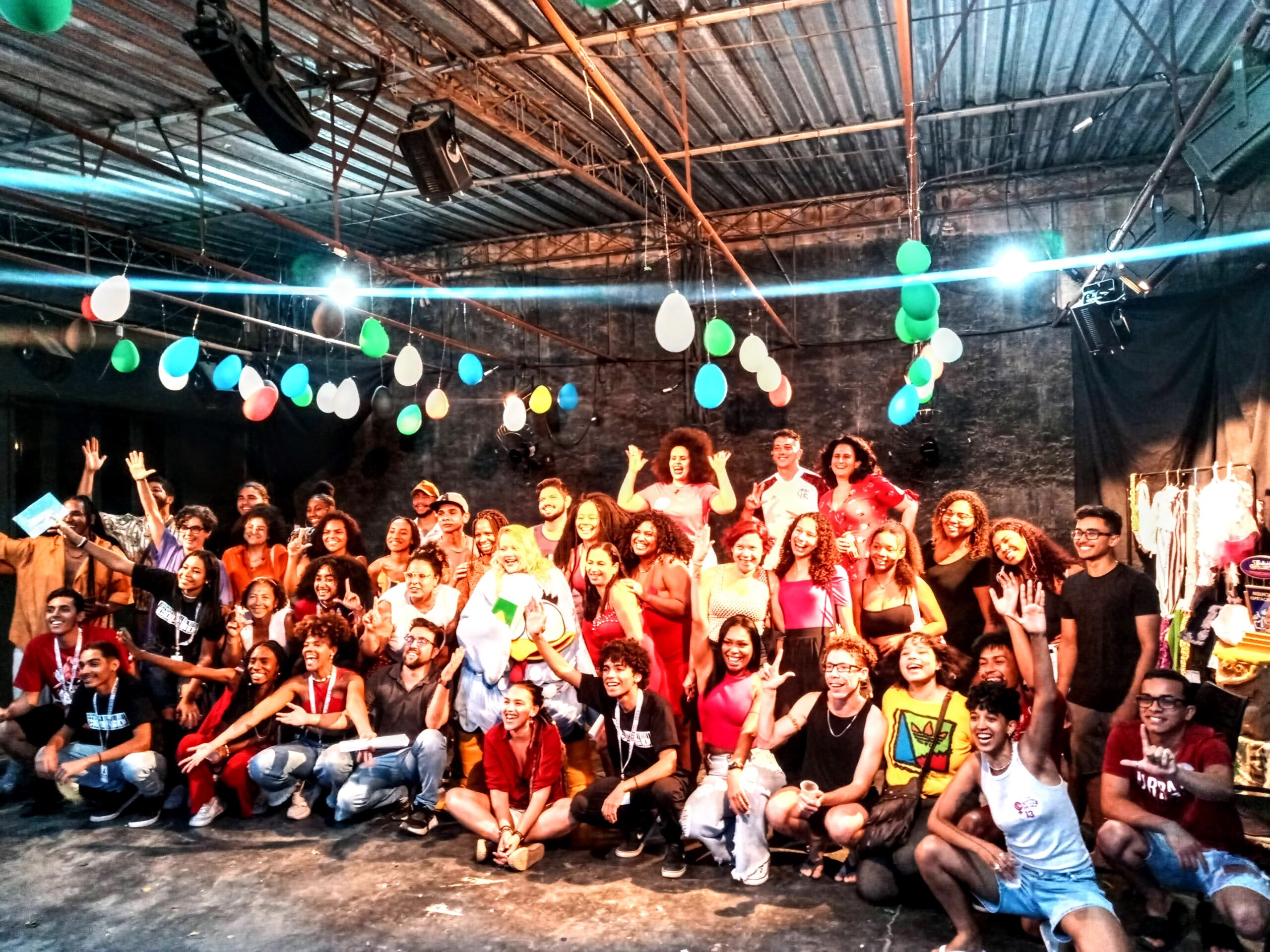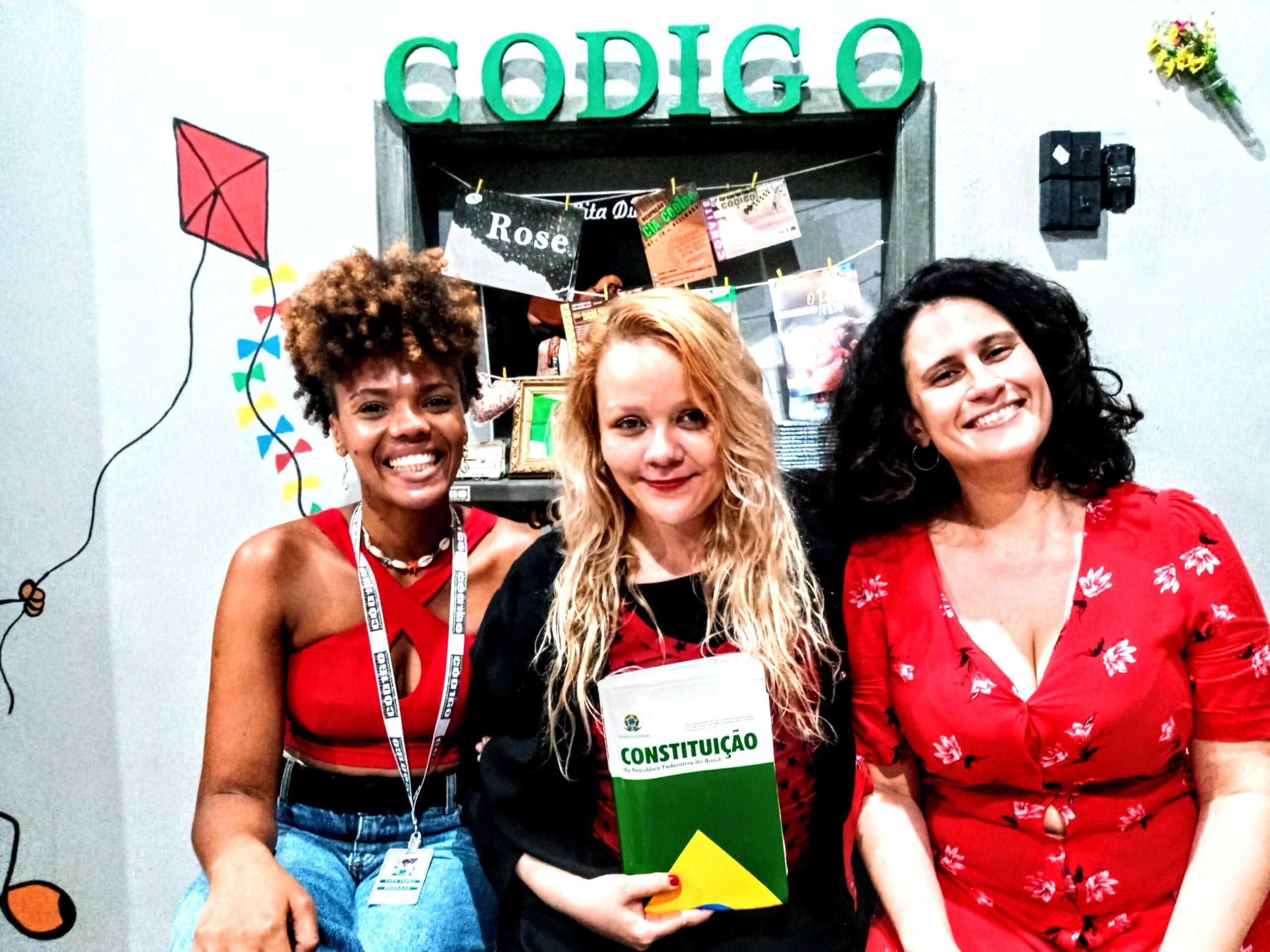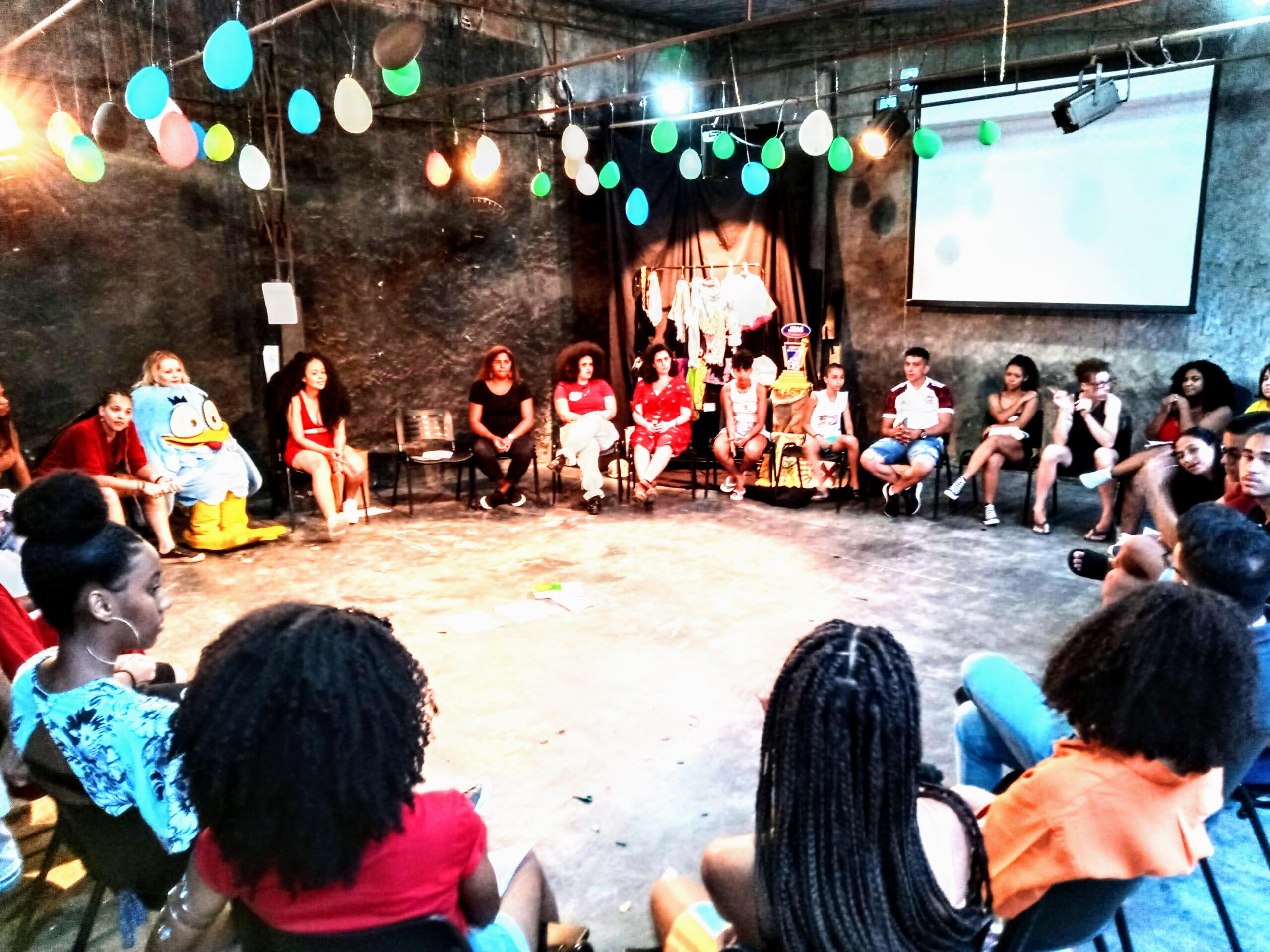
Clique aqui para Português
On October 22, 2022, performing arts group Grupo Código in Greater Rio de Janeiro’s Japeri municipality held its second performance of the play Constitution. The show explores the complex dispute over rights in a popular, accessible, yet nuanced way and was acclaimed by audience members in the Baixada Fluminense.
The story begins with a farmer who purchases a hen and pays for it in installments. However, the animal comes with a ‘manufacturer’s defect’: it can only lay eggs on the land of a neighboring family experiencing food insecurity. Here we reach an impasse: whom do the eggs belong to? The farmer who is ‘leasing’ the animal or the neighbor, whose land is where the hen laid the eggs and whose family needs them more as they are starving? In the play, a lawyer tries to mediate the conflict.
On Stage: Brazilian Society
At Grupo Código’s headquarters in Japeri, nine actors from three different theater groups assembled to perform a dramatic reading of Constitution. Natasha Corbelino, Carolina Godinho, Leona Kali, Carol França, Nil Mendonça, Débora Crusy, Emili Lemos, Marilene Oliveira, and Adrielle Vieira are members of the collectives Que Boca na Cena?, a collective that combines psychoanalysis, politics, and art, in partnership with Psychoanalysts United for Democracy (PUD); Coletivona, a women’s arts group from the favelas of Complexo da Maré in Rio de Janeiro’s North Zone; and Grupo Código, from Japeri in the Baixada Fluminense region north of Rio.

Corbelino opened the show with the only performance of the evening that was acted, rather than read dramatically. She played the part of the chicken. It begins with a description that sets the scene for the story, including the fence that divides the land and supposedly offers security yet does not prevent conflict. The audience sits in a large circle, thus engaging those watching the play with the dramatic reading.
“A part of the earth is called a plot of land when a fence is planted on it. Or walls, cameras, drones, entrances… Fences were put up by man to impose limits on the earth, hiding it, just as earth imposes limits on man,” declared Corbelino, playing the chicken.
Then, the script is read, alternating between each of the actors. According to the text, the hen is an investment—a project demonstrating economic autonomy. After all, she has “excellent market value, since she lays more than one egg a day.”
Meanwhile, days go by with no eggs to be found. Then, the owner realizes the eggs are being laid on the neighbor’s land; the neighboring family is beaten down by high prices and sees the eggs as an alternative to starving to death. The owner of the hen presents a series of legal grounds to justify that the eggs are his. But what would be a just outcome at this impasse?
Constitution is a Social Critique
Produced by actor Natasha Corbelino and written by playwright Cecília Ripoll, Constitution is a critique of society and its economic model. Above all, it hones in on how the current state of affairs challenges the implementation of the rights afforded by the Constitution of the Federative Republic of Brazil—such as the right to food—thus, highlighting the fallacy of ‘economic freedom’ as a purported solution.
In focusing on the federal constitution as a central theme—in a country where many people dislike talking about politics—the creators considered the challenges concerning the storyline’s public reception. Corbelino spoke to RioOnWatch about the challenge of engaging the public with the play’s plot during this age of extremes:
“It’s trying to promote a sort of enchantment with politics, which, at the same time, causes disgust. I think talking about the constitution means really having a desire for the word. The challenge lies in making the word [constitution] evoke enchantment on a day-to-day level, [like something you’d] talk about at a bar.”
The actor highlighted that another challenge is talking about the rights mandated by the constitution for Black, poor, and peripheral communities, in addition to a lack of awareness. She observed that these communities interact with the show in a unique way, concluding:
“How can we talk about rights for people that are being exterminated by the State and are prevented from achieving even their most basic rights? The comments [from the audience] were striking precisely because they are denied such rights. Thus, these individuals have a place to speak and listen [here]: individuals that the constitution is not concerned with.”

“We have a ‘one-chicken micro-entrepreneur,’ who embodies this demand to run his own business and how this mentality can be very cruel. It gives the illusion that we have many tools to win in this economic system. The play’s intention is to reveal this farce,” explained Ripoll, the playwright behind Constitution.
The Inspiration Behind Constitution
In April 2016, while watching the National Congress vote to impeach then-President Dilma Rousseff, Corbelino was stunned, perhaps as millions of Brazilians were. “That’s when the loss of our most evident rights began,” she said. “Always under the motto: ‘For God, country, and family, and against corruption.’”
Against this backdrop, Corbelino decided it was important to develop projects that sought to bring the constitution to the people through diverse art forms. “It cannot be an esoteric reading, we have to talk about it properly, every day and not just in moments of crisis,” she said. Events, performances, and other urban interventions have since been used as means to disseminate information about the constitution.

But what about the chicken? How does it fit into this context? Ripoll says that the hen’s wishes, such as laying her eggs on the neighbor’s land, can be metaphorically interpreted as the process of writing the constitution. More specifically, it could allude to the Constituent Movements, which organized in the year before the constitution was enacted in 1988 with numerous debates spread across the country to promote mass participation in the process. Through this process, a multi-party system of committees and plenary sessions was organized.
“I think, in this case, it can be said that in the same way the Brazilian people sought autonomy and representation through their own laws, the chicken reflects the aspirations of a large portion of Brazilian society, who want the power to decide their own destinies,” explained the playwright.
Through the Constituent Assembly, 122 democratic amendments were circulated, receiving 15 million signatures. The two largest movements were the National Movement for Popular Participation in the Constituent Assembly and the Plenary for Popular Participation in the Constituent Assembly; its motto was an emblematic phrase, marking the historical moment: “A Constituent Assembly without the people does not create anything new.”
Article written by Fabio Leon and produced in a partnership between RioOnWatch and Fórum Grita Baixada. Fabio Leon is a journalist, human rights activist, and media advisor with Fórum Grita Baixada. Fórum Grita Baixada is a coalition of civil society organizations and individuals drawn together in support of initiatives directed at human rights and public security, focused on and acting in the Baixada Fluminense region of Greater Rio.
